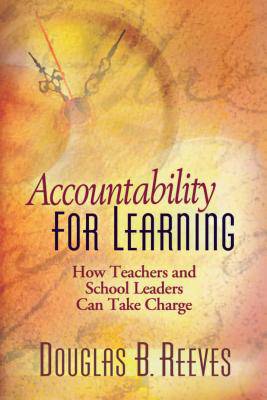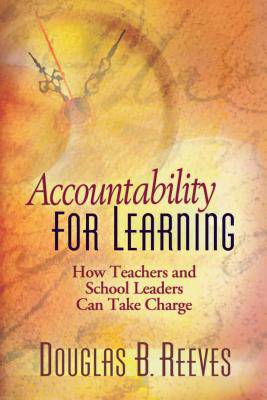
- Retrait gratuit dans votre magasin Club
- 7.000.000 titres dans notre catalogue
- Payer en toute sécurité
- Toujours un magasin près de chez vous
- Retrait gratuit dans votre magasin Club
- 7.000.0000 titres dans notre catalogue
- Payer en toute sécurité
- Toujours un magasin près de chez vous
Accountability for Learning
How Teachers and School Leaders Can Take Charge
Douglas B ReevesDescription
Accountability. The very mention of the word strikes fear in the hearts of many teachers and school leaders, leading to confusion and panic rather than improved student achievement. Author Douglas B. Reeves explains how to transform accountability from destructive and demoralizing accounting drills into a constructive decision-making process that improves teaching, learning, and leadership. Reeves encourages educators to become proactive in developing student-centered accountability systems. These systems capture the many aspects of teaching that test scores don't reveal--they tell the stories behind the numbers. Reeves shows how educators can create accountability systems that enhance teacher motivation and lead to significant improvements in student achievement and equity, even in traditionally low-performing schools.
Accountability for Learning explains how to build a student-centered accountability system by examining key indicators in teaching, leadership, curriculum, and parent and community involvement. Focusing on the classroom, it outlines how teachers can become leaders in accountability by using a four-step process of observation, reflection, synthesis, and replication of effective teaching practices. Finally, the author discusses the role of local, state, and federal policymakers and corrects the myths associated with No Child Left Behind.
"As educators, we have two choices," Reeves says. "We can rail against the system, hoping that standards and testing are a passing fad, or we can lead the way in a fundamental reformulation of educational accountability." Accountability for Learning gives readers the helping hand they need to lead the way to fair and comprehensive accountability.
Spécifications
Parties prenantes
- Auteur(s) :
- Editeur:
Contenu
- Nombre de pages :
- 160
- Langue:
- Anglais
Caractéristiques
- EAN:
- 9780871208330
- Date de parution :
- 15-01-04
- Format:
- Livre broché
- Format numérique:
- Trade paperback (VS)
- Dimensions :
- 154 mm x 231 mm
- Poids :
- 235 g

Les avis
Nous publions uniquement les avis qui respectent les conditions requises. Consultez nos conditions pour les avis.






